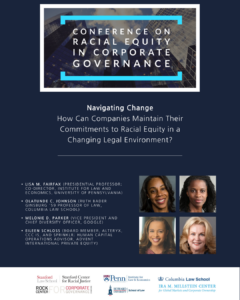Conference on Racial Equity in Corporate Governance Urges Companies to ‘Stay the Course’

Earlier this month, the virtual Conference on Racial Equity in Corporate Governance brought together leaders across industries to discuss the state of racial equity in corporate America and offer perspectives for Boards and top executives about sustainable solutions for diversity, equity, and inclusion (DEI).
Throughout the discussion, panelists urged participants to “stay the course” and continue embedding DEI initiatives into their company’s structure, arguing that this strategy will ultimately help companies weather the storm of legal and political challenges that they are currently facing in today’s highly polarized landscape. This year’s third annual conference was co-sponsored by the Stanford Center for Racial Justice, along with the Ira M. Millstein Center for Global Markets and Corporate Ownership at Columbia Law School; The Howard University School of Law; the Institute for Law and Economics at the University of Pennsylvania; and the Arthur and Toni Rembe Rock Center for Corporate Governance at Stanford.
Event moderator Lisa Fairfax, Presidential Professor and Co-Director for The Institute of Law and Economics at The University of Pennsylvania, kicked off the discussion by recognizing the progress that corporate America has made in recent years. She highlighted that board members from underrepresented racial or ethnic groups make up 46 percent of new boards in the Fortune 500 index today, up from 12 percent a decade ago.
Similarly, panelist Eileen Schloss highlighted that more than 90 percent of S&P 500 companies publish an Environmental, Social, and Governance (ESG) report yearly, which is used to inform shareholders and others about the companies’ values, policies, and actions on key subjects of importance to investors, stakeholders, and policymakers. Both Schloss, a Human Capital Operations Advisor at Advent International Private Equity, and Melonie Parker, Vice President and Chief Diversity Officer at Google, pointed out that the entirety of the ESG movement helps to make DEI a sustainable initiative.
To demonstrate an example, Parker spoke of her own role fostering DEI at Google, telling the audience that the 2020 police murder of George Floyd was a “clarion call to deepen the work” of racial equity or, for many companies, begin to develop sustainable equity. She explained that by engaging and partnering with the Black employee group at Google, her company was able to frame eight racial equity commitments that could make a tangible difference.
Importantly, Parker also explained: “The advisory and consultative support we sought did not put the burden of solving racial equity on these committees, but put the insight, expertise, and counsel with the subject matter expert that’s responsible for carrying out the work.”
The panelists also discussed the relationship between pending Supreme Court cases and the private sector, with Professor Olatunde Johnson advising participants to generally “not overread the decision and do the work of the challengers” in the affirmative action cases against Harvard and the University of North Carolina. Johnson, the Ruth Bader Ginsburg Professor of Law at Columbia, said that while the law on Title VI (the statute at issue) should not have a direct or immediate impact on private workplaces, it could down the line. Some people may use those precedents to bleed into Title VII, which is the statute that would impact workplaces.
“What the case represents is a continual political contestation over inclusion and over affirmative action,” Johnson said. She refuted the idea that “workplaces are a zero-sum model where some people are on top and others bottom,” saying that we “need to have a different discourse, rhetoric, and vision in what we’re trying to do here.” She stressed that everyone benefits from racial justice.

Schloss added that in her experience, the act of private equity firms requiring their portfolio companies to track incremental progress and submit their findings to their individual company boards, has resulted in significant changes in the right direction.
“We need to make sure we’re implementing activities that increase engagement, especially in a virtual environment,” Schloss told participants.
Fairfax later stressed the importance of leadership. She said that when people come to her asking how to be a better ally, she tells them, “I don’t need any more allies, I need a leader.”
When the panelists were asked to provide participants with a lasting pearl of wisdom, Johnson championed the power of personal stories and individualized mentorship in furthering racial justice. Schloss and Parker emphasized the importance of comprehensive data collection and self-identification. “Data powers progress,” Parker said.
All panelists recommended taking a personal approach to racial equity and cultivating empathy across the board. They ended with a plea to the audience: “Please stay the course.”
Click here to watch the full panel discussion.
